The plastic industry’s $30 million lie
Big Plastic’s “advanced recycling” ads are everywhere—and they’re part of a massive greenwashing scam.

If you’ve tuned into any major TV network in the last few months, you may have seen an ad promising a brand new way to end plastic pollution: advanced recycling.
As pastel plastic products fall like dominoes, the ad asks yo…


